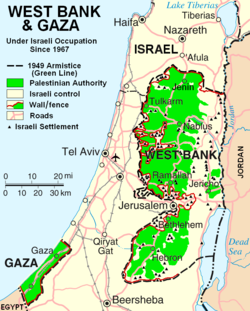Gaza In The Line Of Fire
By IRIN
It was, he said, a horrible twist of fate.
When air strikes began over the Gaza Strip on 14 November, Othman Abdel’Al made what seemed a wise decision. The Israeli air force was targeting, among other things, government offices belonging to the militant group Hamas. Abdel’Al and his family live near a police station; he knew they were not safe.
Thinking it would be a short military operation, Abdel’Al temporarily scattered his family of 12 among the homes of relatives. When the operation dragged on, his wife and three of the children returned to their house this morning to pack some essentials: clothes, food, baby items.

It was only then the bombs fell: three hit the police station, one missed. Within minutes his wife was dead, buried under the rubble of their destroyed home.
Their son Hussein told IRIN the story from Gaza’s Shiffa Hospital, where his father lay screaming in pain, his head bandaged and bloody, his leg broken.
“We left our house searching for safety and life, but death followed us,” Hussein said. “What happened to my family is a crime that has cost us dearly.”
The latest outbreak of violence between Hamas and the Israeli Army has killed 51 Palestinians and three Israelis since 14 November, and has injured hundreds more.
As a result, an increasing number of Gazans are leaving their homes for what they consider safer ground. Exact figures do not yet exist; the insecurity in Gaza has made it difficult for human rights and aid workers to move freely to do assessments.
In its 17 November update, the UN Office for Coordination of Humanitarian Affairs (OCHA) said that while displacement was so far limited, at least 22 families in eastern neighbourhoods of Gaza City were reported to have left their homes for fear of a ground operation by Israel.
The Palestinian Centre for Human Rights has similarly reported anecdotal stories of people moving from areas they fear will be targeted by airstrikes.
Legacy of Cast Lead
More than 15,000 Gazans remain displaced as a result of Israeli military operations in Gaza, including Operation Cast Lead in 2008/9, and the creation of a so-called buffer zone along the border over the last decade. According to a collection of aid agencies in Gaza, known as the Shelter Sector, more than 4,000 of the current displaced have been displaced three times or more since 2009 because of continued conflict and an inability to rebuild their homes. Israel and Egypt have imposed a blockade on Gaza since 2007, restricting the entry of goods, including steel and cement.
Malak Abd Rabbo got the keys to her new home in northeastern Gaza just three months ago.
Less than one kilometer from the Israeli border, the neighbourhood after which her family is named, Ezbet Abd Rabbo, was hard hit by Operation Cast Lead. It took more than three years for her home to be rebuilt, thanks to a Gulf-funded aid project.
Abd Rabbo had just started to move on, settling into her new home and trying to put behind her the memories of all that was lost in her community in 2008/9: hundreds of orange and olive trees, most of their houses and 10 family members.
But in recent days, after Israeli tanks fired warning shells into nearby agricultural areas, she locked up once more and headed south to Jabileya town. Every day she goes back to the border to check on her home, making sure to leave before sunset.
“We are caught in the line of fire,” she told IRIN. “We don’t want our children to be victims again. We don’t want our families to be victims of Israeli occupation again.”
While the UN agency for Palestine refugees (UNRWA) says it can open its schools to the public if needed, displaced families are not yet seeking refuge in public buildings, OCHA noted.
“So far, people are able to cope by going to [stay with] families,” one human rights activist said, “but if a land incursion occurs, the whole situation will change.”
Others say true shelter is already hard to find.
“There is no safe place in Gaza,” said Hamdi Shaqqura, deputy director of program affairs at the Palestinian Center for Human Rights, in reference to the air strikes. “Gaza has no shelter at all.”
